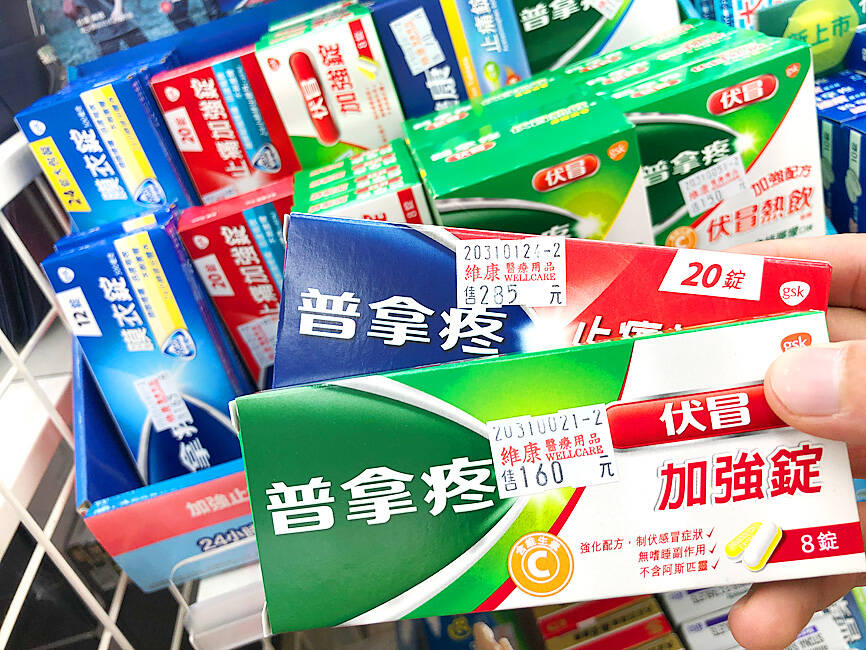The Central Epidemic Command Center (CECC) yesterday said there has been increased bulk buying of Panadol pain relief medicine, causing a shortage in the market, but people who need the medicine are recommended to buy pain relief medicine that contains the same ingredient — acetaminophen — from other brands.
In a Cabinet meeting for COVID-19 prevention and response yesterday morning, the CECC said that although the Chinese government stopped releasing comprehensive data on new cases on Tuesday last week, many news outlets reported a shortage in fever and pain-relief drugs, as well as traditional herbal medicines, indicating an increase in the number of people with fever, so it is likely that COVID-19 cases are rising in China.
The Bureau of Consular Affairs has observed more people applying to renew their passports, and many people are expected to travel abroad or return to Taiwan from the year’s end to around the Lunar New Year next month, Premier Su Tseng-chang (蘇貞昌) said.

Photo: CNA
Deputy Minister of Health and Welfare Victor Wang (王必勝), who heads the center, said the center had seen an increase in bulk buying of Panadol, a common drug for reducing pain and fever, and it has contacted the brand’s distributor in Taiwan to ask it to increase its supply, but the distributor said Panadol is in tight supply in other countries too.
There are 47 permits for producing drugs with acetaminophen held by several drug companies, so people can buy the medicine produced by other brands if they cannot find Panadol, he said.
However, Wang urged people to only buy acetaminophen when needed, and to avoid buying the medicine in bulk.
The CECC yesterday reported 10,317 new local COVID-19 cases — 4.7 percent lower than that on Monday last week — as well as 48 imported cases and 23 deaths.
Wang said 107,315 local cases were confirmed last week, 6.7 percent higher than the week before, so whether the weekly cases continue to fluctuate, or start to escalate into another wave, is uncertain and requires further observation.
Centers for Disease Control Deputy Director-General Philip Lo (羅一鈞), deputy head of the CECC’s medical response division, said that of the 23 deceased, 16 had not been vaccinated.
Of the genome sequenced cases last week, 84 percent of the local cases were infected with the Omicron BA.5 subvariant of SARS-CoV-2, which remains the dominant strain in Taiwan, he said.
Although BA.5 infections accounted for 38 percent of the sequenced imported cases last week, 29 percent were infected with BA.2.75 and 17 percent were infected with BQ.1, he said.
Regarding whether new subvariants could enter Taiwan from China, where cases are surging, Lo said two sequenced imported cases from China last week were infected with the BF.7 strain, which has mainly been reported near Beijing, and another with BA.5.

Trips for more than 100,000 international and domestic air travelers could be disrupted as China launches a military exercise around Taiwan today, Taiwan’s Civil Aviation Administration (CAA) said yesterday. The exercise could affect nearly 900 flights scheduled to enter the Taipei Flight Information Region (FIR) during the exercise window, it added. A notice issued by the Chinese Civil Aviation Administration showed there would be seven temporary zones around the Taiwan Strait which would be used for live-fire exercises, lasting from 8am to 6pm today. All aircraft are prohibited from entering during exercise, it says. Taipei FIR has 14 international air routes and

Taiwan lacks effective and cost-efficient armaments to intercept rockets, making the planned “T-Dome” interception system necessary, two experts said on Tuesday. The concerns were raised after China’s military fired two waves of rockets during live-fire drills around Taiwan on Tuesday, part of two-day exercises code-named “Justice Mission 2025.” The first wave involved 17 rockets launched at 9am from Pingtan in China’s Fujian Province, according to Lieutenant General Hsieh Jih-sheng (謝日升) of the Office of the Deputy Chief of the General Staff for Intelligence at the Ministry of National Defense. Those rockets landed 70 nautical miles (129.6km) northeast of Keelung without flying over Taiwan,

The Ministry of National Defense (MND) today released images of the military tracking China’s People's Liberation Army (PLA) movements during the latest round of Chinese drills around Taiwan. The PLA began "Justice Mission 2025" drills today, carrying out live-fire drills, simulated strikes on land and maritime targets, and exercises to blockade the nation's main ports. The exercises are to continue tomorrow, with the PLA announcing sea and air space restrictions for five zones around Taiwan for 10 hours starting from 8:30am. The ministry today released images showing a Chinese J-16 fighter jet tracked by a F-16V Block 20 jet and the

City buses in Taipei and New Taipei City, as well as the Taipei MRT, would on Saturday begin accepting QR code payments from five electronic payment providers, the Taipei Department of Transportation said yesterday. The new option would allow passengers to use the “transportation QR code” feature from EasyWallet, iPass Money, iCash Pay, Jkopay or PXPay Plus. Passengers should open their preferred electronic payment app, select the “transportation code” — not the regular payment code — unlock it, and scan the code at ticket readers or gates, General Planning Division Director-General Liu Kuo-chu (劉國著) said. People should move through the